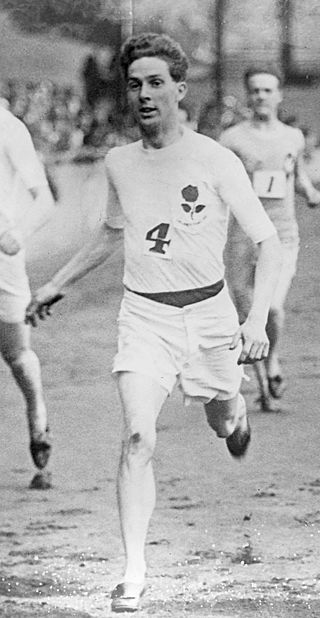Born in Neath, Cecil Griffiths became one of Britain’s youngest Olympic gold medalists in athletics when he ran the first leg in the triumphant British 4 x 440 yards relay squad in Antwerp in 1920 and the age of 20. The third leg was run by fellow Welshman and Roll of Honour inductee, John Ainsworth Davis. He clocked 50.6 sec for his leg and gave the British quartet a lead they were never to lose. Illness prevented him from running in the individual event. Ainsworth-Davis took his place and finished fifth in the final and the day after receiving his gold medal he was back at work in London.
During the course of his career, he set three British best times at 880 yards and 1,000 metres. His Welsh 440 yards record of 49.8 sec set in winning the 1921 Welsh title at Barry Island stood for 32 years and would have won him the Welsh title in 2012.
He was a finalist at the AAA Championships at either 440 or 880 yards for nine successive year and he won the half mile twice in 1923 and 1925; and finished third over 440 yards three times between 1919 and 1921. His finest race came in the 1926 AAA 880 yards. He finished third in a race that turned into a battle between Germany’s Otto Peltzer and Britain’s double Olympic champion, Douglas Lowe, which Peltzer won in a UK all-comers record of 1:51.6. Lowe finished just three yards behind in an estimated time of 1:52.0, which was by far the fastest ever time recorded by a British athlete over the distance.
In Manchester in 1924 and 1925, he won the 880 yards handicap off scratch in 1:54.6 on each occasion, although for some unknown reason, his winning time in 1924 was never ratified as a British record. He won 10 Welsh titles, including five successive victories over 440 yards between 1920 and 1924, and four half-mile wins. He also took the 220 yards title in 1921.
He lost out on his chance of glory at the 1924 Olympics in Paris, which was won by Eric Liddell of ‘Chariots of Fire’ fame, because the administrators at the AAA uncovered at the time of selection that seven years earlier he had unwittingly accepted a small prize as a 17-year-old whilst still living in Neath. Although reinstated by the AAA he was banned from international competition by the IAAF.
In Stockholm later in 1924, despite the IAAF ban on international competition, he broke the British record for 1,000 metres when finishing second in 2:33.6 to world record holder Sven Lundgren of Sweden. Lundgren had finished fifth in the 1920 Antwerp Olympic 1,500. He lowered his 1,000m British best to 2:31.8 at Stamford Bridge the following year, to bring his British best tally to three.
The IAAF could not have been aware of his 1917 misdemeanour in 1921 as he took part in England’s first recorded international match, against France in Paris. He finished second in the 400 and was part of England’s winning medley relay team. In the return fixture at Stamford Bridge in 1922 he won the 400m in 50.8 and finished second behind teammate Edgar Mountain in the 800. He returned to Paris the year before his non selection for the 1924 Olympic team winning the 800 in 1:57.0 and finishing third in the 400.
Cecil Redvers Griffiths (Athlete) Born in Neath on 18 February, 1900; Died in London on 11 April, 1945
* Details provided by Clive Williams, Welsh Athletics Historian and WSHOF trustee





